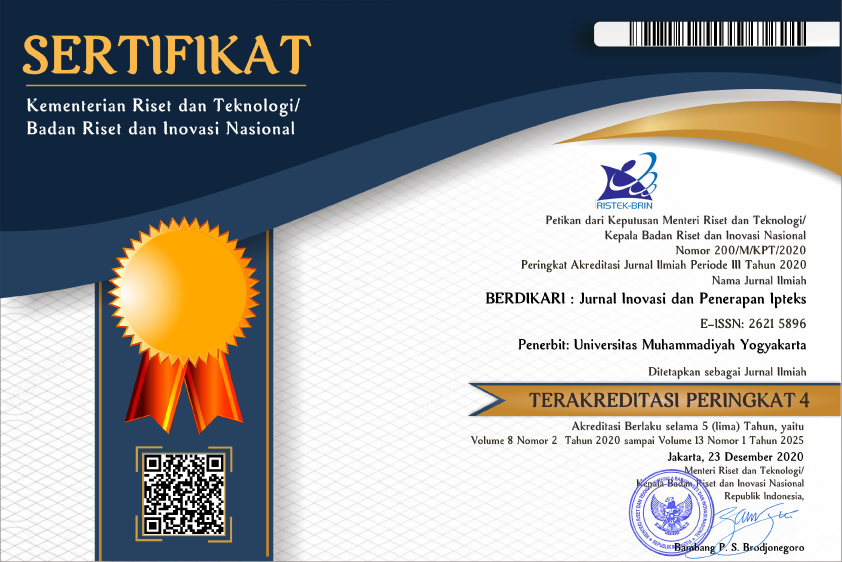Pemanfaatan Hasil Olahan Pertanian Berbasis Masjid
DOI:
https://doi.org/10.18196/bdr.7266Keywords:
society’s empowerment, mosque, transfer of knowledge, processed agricultural productsAbstract
The Regency of Kulon Progo has tourism and agriculture potentials. The same condition also applies to Jatimulyo village which is one of the villages in Kulon Progo. Jatimulyo has a good agriculture potential, such as aren (sugar palm). Jatimulyo has recently been developing after the access from the village to the city center had become better. As such, the society of the area needs to be encouraged to better improve. The society’s potential that can be developed is business with the basis of processed agricultural products. To realize the goal, various society’s empowerment programs are held to promote the society’s awareness on distribution method so that their agricultural products can be competitive and can gain optimum profit. The programs are held through the methods of counseling, recitation, and a provision of stimulating fund. The results from the counseling given to mosque basis partners are transfer of knowledge on the urgency of processed agricultural products, farming group at Gunung Kelir, and variations of processed agricultural products.
References
Amin, A., Sitorus, S., Yusuf, B. (2016) Pemanfaatan limbah tongol jagung (zea mays l.) sebagai arang aktf dalam menurunkan kadar amonia nitrit dan nitrat pada limba cair industri tahu menggunakan teknik celup. Jurnal Kimia Mulawarman, 11(2): 78-84.
Archer, S. E., Kelly, C. D., & Bisch, S. A. (1984). Planning and Change Processes. Implementing Change in Communities: A Collaborative Process. St. Louis: The C.V. Mosby Company.
Ardian, I. W., Widodo, Y., Liman (2015) Potensi pakan hasil limbah jagung (zea mays l.) di desa braja harjosari kecamatan braja selebah kabupaten lampung timur. Jurnal Ilmiah Peternakan Terpadu, 3(3): 170-174.
Badan Pusat Statistik (BPS) Kabupaten Kulon Progo. (2018a) Kabupaten Kulon Progo Dalam Angka 2018. Yogyakarta: Penyusun.
Badan Pusat Statistik (BPS) Kabupaten Kulon Progo. (2018b) Kecamatan Girimulyo Dalam Angka 2018. Yogyakarta: Penyusun.
Bandura, A. (1971). Social learning theory. New York: General Learning Press.
Bandura, A. (1977). Self-efficacy: Toward a unifying theory of behavioral change. Psychological Review, 84: 191-215.
Bronfenbrenner, U.(1979). The ecology of human development: Experiments by nature and design. Cambridge, MA: Harvard University Press.
Cavaye, J. (2015) Understanding community development. Quensland: Cavaye Community Development
Correy, G (2012) Theories and practice of counselling and psychotherapy. Belmont: Brooks-Cole Cengage Learning.
Flora, C.B., & Flora, J.L. (1993). Entrepreneurial social infrastructure: A necessary ingredient. Annals of the American Academy of Political and Social Sciences 539: 48-58.
Flora, C., & Arnold, N. (2012). Community development. State of The Science Report. Montana: RTC-Rural The University of Montana.
Miltenberger, E.G. (2015) Behavior Modification: Principles and Procedures. Belmont: Cengage Learning.
Koentjoro, Sadewo, P. H., Andayani, B. (2016) Community Engagement or Community Development. Presentasi pada The 10th Global Regional Centres of Expertise on Education for Sustainable Development (RCEs on ESD) 23 - 25 November 2016, Universitas Gadjah Mada, Yogyakarta, Indonesia.
Sari., M. (2016) Pemanfaatan limbah jagung untuk pembuatan biskuit pakan hijauan di kecamatan lima kaum batusangkar. Journal of Sainstek 8(2): 166-172.
Velasco, X. C. (2013) Participatory Action Research (PAR) for Sustainable Community Development. Dilihat pada 23 Juni 2019 dari postgrowth.org
Downloads
Published
Issue
Section
License
Copyright
Authors retain copyright and grant BERDIKARI Jurnal Inovasi dan Penerapan IPTEK the right of first publication with the work simultaneously licensed under an Attribution 4.0 International (CC BY 4.0) that allows others to remix, adapt and build upon the work with an acknowledgment of the work's authorship and of the initial publication in BERDIKARI Jurnal Inovasi dan Penerapan IPTEK.
Authors are permitted to copy and redistribute the journal's published version of the work (e.g., post it to an institutional repository or publish it in a book), with an acknowledgment of its initial publication in BERDIKARI Jurnal Inovasi dan Penerapan IPTEK
License
Articles published in the BERDIKARI Jurnal Inovasi dan Penerapan IPTEK) are licensed under an Attribution 4.0 International (CC BY 4.0) license. You are free to:
- Share — copy and redistribute the material in any medium or format.
- Adapt — remix, transform, and build upon the material for any purpose, even commercially.
This license is acceptable for Free Cultural Works. The licensor cannot revoke these freedoms as long as you follow the license terms. Under the following terms:
- Attribution — You must give appropriate credit, provide a link to the license, and indicate if changes were made. You may do so in any reasonable manner, but not in any way that suggests the licensor endorses you or your use.
- No additional restrictions — You may not apply legal terms or technological measures that legally restrict others from doing anything the license permits.




